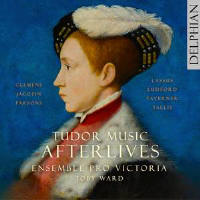Texte paru dans: / Appeared in: |
|
|
Outil de traduction |
|
|
This intriguing recital brings us music from a period that is very well documented on record but much of what we hear is new – albeit not just in the usual sense of not having been recorded previously. Most of it has necessitated a degree of reconstruction; that is, missing parts or sections have had to be supplied through the ingenuity of latterday researchers. The two most striking examples here are the organ verses for the Kyries of two of Ludford’s Lady Masses, which would have been improvised and are here supplied by Magnus Williamson, whose playing is one of the highlights (the merry din of his instrument’s regal stop should raise a smile). We also have Williamson to thank for supplying missing voices for Sheppard’s settings of Sternhold’s metrical psalms. The debt is indeed considerable, for only one of the four part-books originally containing them survives. But the result is very convincing: contrapuntally straightforward, these settings have a rugged charm, which the singers of Ensemble Pro Victoria convey very effectively, with nicely judged word-accentuation (in When I look back or Attend my people). The Sheppard shows the ensemble at their best, and I’d also heartily recommend the Ludford. Both these ‘firsts’ earn their place in the catalogue straight away, and Sheppard’s psalms ought to attract collegiate institutions and amateur choirs. The English-language pieces are uniformly successful, beginning with Tallis’s I call and cry; far less effective is the enunciation of the French in the songs by Jacotin and Van Wilder, which sits too deep in the throat and fails to contrast with the English or the Latin. Elsewhere the vibrato-laden approach (especially audible in the upper voices) can be distracting, as in the Alleluias by Ludford. The problems are compounded when pitches are not properly centred, as in much of the Kyrie of Ludford’s Mass IV, or the top line’s initial entry in O splendor gloriae (the Taverner Consort’s account of this outgoing showpiece underlines the shortcomings here). But to balance these caveats, the ‘new music’ will be greeted wholeheartedly by anyone interested in Tudor polyphony. |
|
_small.jpg)



